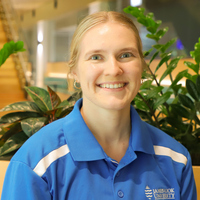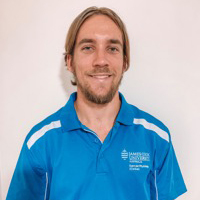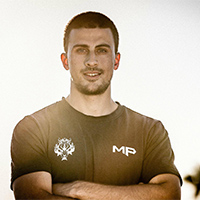Fast Facts
Location
Commencing
- Townsville: February, July
Fees
$11,651.00+
+estimated annual Commonwealth Supported Fee for a full-time study load
Plus Student Services and Amenities fee
Fee deferral and scholarships available if eligible
Duration
3 years full-time
3.5 years full-time for mid-year entry
Entry Requirements
ATAR 64
English (Units 3/4,C), General Maths, Mathematical Methods or Specialist Maths (Units 3/4)
Recommended Knowledge
One of Biology, Chemistry, Physics, Health, Psychology or Physical Education (Units 3/4,C)
QTAC Codes
- 316111
Course detail
Be equipped with theoretical and practical skills to help individuals and athletes improve their physical performance, focussing on North Queensland’s tropical climate and cultural heritage.
Learn the scientific principles underlying the benefits of physical activity, focussing on the role of sport and exercise. You’ll gain in-depth knowledge of sport and exercise science as you study in state-of-the-art facilities, including the Movement Analysis Lab and the JCU Performance Science Hub.
Benefit from practical work experience alongside industry professionals. Assess, design, and deliver specialist exercise programs for a variety of people, from community members to elite athletes.
JCU Sport and Exercise Science graduates are highly-competent, motivated, and career-ready professionals.
View the Handbook for a detailed overview of available subjects, as well as pre-placement requirements.
About JCU's Bachelor of Sport and Exercise Science
Make a difference in the lives of individuals and communities. Help athletes enhance their performance, improve quality of life for those suffering from chronic conditions, or teach the next generation the importance of nutrition and exercise. Build critical thinking skills with a Bachelor of Sport and Exercise Science (similar to a bachelor of sports science) from JCU.Learn from the Best
Your world-class education begins here, where you work with skilled lecturers committed to student success and partner with leaders in rehabilitation. You will participate in research that matters, learning about the processes of human physical activity and contributing to important international research initiatives. Gain practical experience and clinical skills in JCU's world-class training facilities throughout your exercise science degree. These include JCU’s Exercise Testing and Rehabilitation Clinic and the Movement Analysis Lab.Build foundational knowledge in areas like sports psychology, anatomy, physiology, nutrition and biomechanics. Working alongside specialists and experienced professionals, you will learn how to implement theory in a practical setting.
Move Beyond the Classroom
Experience has no substitute, and at JCU you gain valuable first-hand experience from the start when you study sports science. Along with opportunities to work in research, you will take part in clinical placements and work with people from different cultures and socioeconomic conditions. Learn how to design exercise programs for athletes or explore the intricacies of occupational wellness issues in corporations. Understand how to empower others to incorporate exercise as part of an overall wellness plan, and see first-hand how sports can make a difference in marginalised communities.Be Ready For Employment
A degree and a job are important, and as you study exercise science you will fast track your career goals and build your network of professional relationships. Be career-ready with the extensive practical experience that employers are looking for when you graduate with your exercise science bachelor degree. Your degree from JCU (which is similar to a bachelor of exercise and sport science) is accredited by Exercise and Sports Science Australia, and you are eligible to join ESSA professionally upon graduation. Your sports science university degree opens many potential career paths. You could work in research or teaching or make a difference in the community by promoting community health. You could work in a hospital, partnering with doctors to help patients rehabilitate.Start Planning for Tomorrow
Whether you want to work in rural or urban areas, in community health or among athletes, your Bachelor of Sport and Exercise Science from JCU (similar to a bachelor of exercise and sport science) will get you there. Get yourself ready for the jobs of tomorrow with a degree from JCU.Hide additional information
Inherent requirements
Inherent requirements are the identified abilities, attributes, skills, and behaviours that must be demonstrated, during the learning experience, to successfully complete a course. These abilities, attributes, skills, and behaviours preserve the academic integrity of the University’s learning, assessment, and accreditation processes, and where applicable, meet the standards of a profession. For more information please review the inherent requirements for the Bachelor of Sport and Exercise Science.
Honours
The Bachelor of Sport and Exercise Science (Honours) degree is available for high-achieving students. It consists of extra study and the development of a personal research project and thesis. An Honours degree is usually essential for entry to research higher degrees. Please refer to the Bachelor of Sport and Exercise Science (Honours) Handbook for eligibility information. Complete an application through our Online Application Portal.
JCU Sport and Exercise Science graduates are highly-skilled and are employed in a range of health-related industries.
Graduates pursue careers in various areas including health and wellness management, health promotion agencies, sports training and rehabilitation, hospital-based science, and occupational health and safety.
Students who successfully complete the Bachelor of Sport and Exercise Science can enrol in a Master of Clinical Exercise Physiology, which can lead to employment as a clinical exercise physiologist. Alternatively, go on to study the Bachelor of Sport and Exercise Science (Honours).
Graduates of this course are eligible for professional membership with Exercise and Sports Science Australia.
Entry score threshold
These are the lowest adjusted scores we made an offer to in Semester 1, 2023. Entry scores are based on the most recent Semester 1 intake and are updated in June each year. Meeting the threshold doesn't guarantee admission.
ATAR/Selection Rank: 69.35
Entry score range
This table shows the range of entry scores for recent secondary students offered a place in the Bachelor of Sport and Exercise Science for Semester 1, 2023. The table includes offers deferred to Semester 1, 2023 which may have been assessed using the entry score threshold of an earlier year.
JCU Townsville
Without adjustments | With adjustments* | |
|---|---|---|
Highest | 89.20 | 97.20 |
Median | 71.70 | 74.00 |
Lowest | 64.05 | 69.75 |
Notes:
<5 – indicates less than 5 OP/ATAR-based offers made.
* Refer to Adjustment Factors
Find out more about who you might study with by viewing this course’s student profile.
Adjustment factors
James Cook University applies bonus ranks under the Regional Preference Scheme and QTAC’s Educational Access Scheme (EAS). Learn more about JCU’s adjustment factors.
Handbook year | Information valid for students commencing in 2024 |
Course code | 70610 |
Course type | Bachelor Degree (AQF Level 7) |
Professional accreditation status | This course is accredited with Exercise and Sports Science Australia (ESSA Accreditation). Graduates of non-English speaking backgrounds applying for ESSA accreditation must show English language competence. This can be demonstrated by completion of the International English Language Testing System (IELTS) with attainment of a score of at least 7 overall and for each of the four components (listening, reading, writing and speaking). Equivalent testing by TOEFL iBT, PTE Academic or C1 Advanced is also accepted. |
Owner | Academy |
College | Healthcare Sciences |
Award Requirements
Admission Requirements
Course pre-requisites | English (Units 3/4,C); General Maths, Mathematical Methods, or Specialist Maths (Units 3/4,C) Recommended: one of Biology, Chemistry, Physics, Health, Psychology or Physical Education (Units 3/4,C) |
Minimum English language proficiency requirements | Applicants of non-English speaking backgrounds must meet the English language proficiency requirements of Band 2 – Schedule II of the JCU Admissions Policy. |
| Additional selection requirements | Information published by JCU or otherwise made available to students when applying, may specify additional criteria to be considered in ranking applicants in order of merit if the number of applications exceeds a quota or other limit on the places made available for the course. Information provided by applicants during the application process and any other information obtained by JCU in the application process may be used by JCU to rank applicants in order of merit by reference to those additional criteria. |
Course includes mandatory professional placement(s) | Clinical placement/professional practice: This course includes prescribed professional or clinical placements. Students may be required to undertake such placements away from the campus at which they are enrolled, at their own expense (Note: health professional courses generally involve extensive professional or clinical placements). Further information about placements can be found at Coursework Enrolment Procedure. |
Post admission requirements | This course may have specific admission requirements such as immunisation, a Suitability to Work with Children Card, a federal police check and/or other conditions that students must comply with. Students must complete all professional experience placement requirements by the prescribed deadlines and maintain currency of these requirements in order to stay admitted in the course. You will find your course requirements here: https://www.jcu.edu.au/professional-experience-placement/preparation-checklists |
Academic Requirements for Course Completion
Credit points | 72 credit points as per course structure |
Course learning outcomes | James Cook University’s Bachelor of Sport and Exercise Science meets the Exercise and Sports Science Australia standards for Exercise Science membership. On successful completion, graduates of the course will be able to:
|
Inherent Requirements
Inherent Requirements | Inherent requirements are the identified abilities, attributes, skills, and behaviours that must be demonstrated, during the learning experience, to successfully complete a course. These abilities, attributes, skills, and behaviours preserve the academic integrity of the University's learning, assessment, and accreditation processes, and where applicable, meet the standards of a profession. For more information please visit: Bachelor of Sport and Exercise Science. |
Reasonable adjustments | All JCU students have the opportunity to demonstrate, with reasonable adjustments where applicable, the inherent requirements for their course. For more information please visit: Student Disability Policy and Procedure. |
Course Structure
CORE SUBJECTS
Level 1
Teaching Period 1:
BM1061:03 Anatomy and Physiology for Sport and Exercise Science 1
SP1003:03 Communication for Sport and Exercise Science and Exercise Physiology (Clinical)
PY1101:03 Exploring Psychology 1
SP1011:03 Physical Activity for Health
Teaching Period 2:
BM1062:03 Anatomy and Physiology for Sport and Exercise Science 2
PH1001:03 Preparatory Physics
SP1002:03 Nutrition for Health and Physical Activity
SP1012:03 Exercise and Sports Testing
Level 2
Teaching Period 1:
SP2003:03 Functional Kinesiology and Biomechanics
SP2007:03 Physiological Basis for Exercise and Sport
SP2009:03 Strength Training and Conditioning
SP2201:03 Exercise Prescription
Teaching Period 2:
HS1401:03 Health and Health Care in Australia
SP2010:03 Principles of Motor Learning and Motor Control
SP2207:03 Dynamics of Sport and Exercise Behaviour
SP2016:03 Exercise Prescription and Delivery
Level 3
Teaching Period 1:
HS2402:03 Health Professional Research 1
SP3106:03 Applied Physiological Basis for Exercise and Sport
SP3008:03 Practicum in Sport and Exercise Science/Clinical Exercise Physiology
SP3015:03 Advanced Motor Learning and Motor Control
Teaching Period 2:
SP3011:03 Sports Training and Rehabilitation
SP3018:03 Advanced Biomechanics
SP3014:03 Independent Project in Sport and Exercise Science and Clinical Exercise Physiology
SP3017:03 Principles of Clinical Exercise Physiology Practice or SP3020:03 Contemporary Practices in Sport Science
Location
COURSE AVAILABLE AT | NOTES |
JCU Townsville | Mid-year entry available (Please note students will complete the course in 3.5 years when starting mid-year) |
Candidature
Expected time to complete | 3 years full-time or part-time equivalent |
Maximum time to complete | 8 years |
Maximum leave of absence | 2 years |
Progression
Course progression requisites | Nil |
Course includes mandatory professional placement(s) | This course includes prescribed professional or clinical placements. Students may be required to undertake such placements away from the campus at which they are enrolled, at their own expense (Note: health professional courses generally involve extensive professional or clinical placements). Further information about placements can be found at Coursework Enrolment Procedure. |
Special assessment requirements | Refer to Review of a Student’s Suitability to Continue a Course Involving Placement policy. |
Professional accreditation requirements | Nil
|
Supplementary exam for final subject | Not applicable |
Credit
Eligibility | Students may apply for credit transfer for previous tertiary study in accordance with the Credit Transfer Procedure. |
Maximum allowed | 36 credit points |
Currency | Credit will be granted only for studies completed in the 10 years prior to the commencement of this course. |
Expiry | Credit gained for any subject shall be cancelled 18 years after the date of the examination upon which the credit is based if, by then, the candidate has not completed this course. |
Other restrictions | A maximum of 9 credit points of credit may be granted at level 3. Recognition of Prior Learning (RPL) will not be applied for non-university study or work experience. |
Award Details
Award title | BACHELOR OF SPORT AND EXERCISE SCIENCE |
Approved abbreviation | BSpExSc |
Inclusion of majors on testamur | Not applicable - this course does not have majors |
Exit with lesser award | Students who have completed 24 credit points of their course award requirements, and withdraw from or fail to meet the requirements for progression in the later years, may be eligible for the award of Diploma of Tertiary Studies. Students who have completed 48 credit points of their professional course award requirements, and withdraw from or fail to meet the requirements for progression in the later years, may be eligible for the award of Associate Degree of Health Sciences. |
Course articulation | Not applicable |
Special awards | Students may receive an Award of Recognition in accordance with the Recognition of Academic Excellence Procedure |
Honours
Honours availability | Honours available as an additional year of study |
Eligibility | Candidates must satisfy the School requirements relating to the standard of academic achievement necessary to proceed to the honours degree. |
Estimated annual Commonwealth Supported fee: $AUD11,651.00
A Student Services and Amenities fee is payable per subject up to a maximum amount per year.
A variety of Scholarships are available to suit different student types.
JCU Prep provides a pathway into this course. Enrolling in this flexible program will enable you to meet entry requirements including subject pre-requisites and ATARs. Introductory academic subjects are also available to prepare you for tertiary study.
*Excludes entry into the Bachelor of Advanced Science, Bachelor of Dental Surgery, Bachelor of Laws, Bachelor of Marine Science, Bachelor of Medicine, Bachelor of Surgery, Bachelor of Nursing Science – Bachelor of Midwifery, Bachelor of Pharmacy (Honours), Bachelor of Physiotherapy, and Bachelor of Veterinary Science (Honours).
Note the course QTAC code for the location you've chosen. You'll need to enter it as part of your QTAC application.
Application dates vary between courses, whether they're delivered in semester, trimester or carousel study modes. View our Application due dates page for more information.
ATAR score is indicative only. Entry scores will be finalised in the major offer round.
Real stories
-

Student
Kirsty Stevens
Bachelor of Sport and Exercise Science
I like the idea of getting a more in-depth understanding of concepts related to sport and exercise, and I’m thoroughly enjoying the face-to-face components of this course. The lecturers are very friendly, and they care deeply about helping us to succeed. The compulsory kindergarten placement was also very beneficial.
-

Student
Josiah McCarthy
Bachelor of Sport and Exercise Science
What I like about JCU is that it has small class sizes so you get to know your lecturers. The lecturers really help you and give you great opportunities in the field that help further your career, such as internships, volunteering, and participating in research.
-

Alumni
Adon Alves
Bachelor of Sport and Exercise Science
During my time at JCU we covered interesting subtopics in sport and exercise science, including biomechanics, motor learning, sport psychology, and strength and conditioning. All lecturers and tutors are passionate about their field which provided motivation and encouragement and helped me expand on my own interests.
-

Lecturer
Associate Professor Fiona Barnett
Head, Sport and Exercise Science
Our program is a great way to learn about how to make a difference for individuals and communities. You’ll learn about the processes of human physical activity from skilled lecturers who are committed to student success. You'll also gain practical experience in world-class training facilities throughout your studies.
-

Employer
Luke Gauci
Director, Mindset Performance Fitness Centre
It’s been good having JCU graduates as they bring skills that are up to date with the current information in the industry. In this industry, having staff who are JCU graduates is an extra qualification a lot of personal trainers don’t have. So I’ve gone out of my way to look for people with those qualifications.